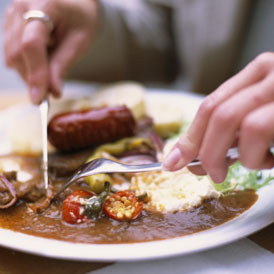Manners maketh the Lady
When Carolyn Bourne sent an e-mail correcting her future daughter-in-law’s manners, she did not expect it to become public. But etiquette expert William Hanson writes that she got most of it right.

Everyone has difficult relatives, but this case has to reach the zenith of mother-in-law conflicts
Carolyn Bourne chose to admonish Heidi Withers by email and in using such a method it posed two problems: it meant that a written record of her etiquette lesson existed and could be circulated, and also that any hint of irony, sarcasm or kindliness was lost, as in the written word it is very hard indeed to convey tone unless one is a skilled writer. (That said, I don’t think in this case there was much irony or sarcasm intended.)
The trouble with Mrs Bourne’s email is that she makes some very valid points – all of which (from a strict etiquette point of view) are correct. It was just the phraseology and method that undermines her message.
Here’s why she is right.
“When you are a guest in another’s house, you do not declare what you will and will not eat – unless you are positively allergic to something.”
If you have dietary needs (allergies, intolerances) then it is polite to inform your host of these before the meal (a day or two is preferable). Obviously if something is served that you just cannot eat as you would have a severe reaction to it, then you gracefully explain why and leave it. However, if you simply just don’t like fish, or are not a fan of mushrooms, do not sit there and put up a fuss. Try a little bit, and then leave the rest.
“You do not remark that you do not have enough food. You do not start before everyone else.”
It is customary to wait for your host/hostess to begin their meal, and/or the most senior diner (guest of honour), before you eat yours. If the host tells you to start before theirs is ready then you may do so.
“You do not take additional helpings without being invited to by your host.”
If the rest of the food is not on the table (i.e., not in communal serving dishes) then you certainly do not leave the table and help yourself unless given instruction by the host. If food is on the table, or drink, then offer your fellow guests (those next to you) the food/drink before you serve yourself.
“When a guest in another’s house, you do not lie in bed until late morning in households that rise early. You fall in line with house norms.”
This is true if you are a houseguest for a couple of days. The hostess should say the day before “breakfast is at 8am” and the guest should realise that if they want their morning sustenance that this is when they need to present themselves (ideally, showered and dressed).
After Miss Withers had married into the family (an unlikely situation now, I feel) then it would be more acceptable to have the odd lie-in as she got to know the family better. But still, as your hosts, you should adhere to their house rules, but they should show some flexibility to you as their guest.
“No one gets married in a castle unless they own it. It is brash, celebrity style behaviour.”
This was certainly true years ago when Mrs Bourne was brought up as historic properties were not available for day rent, but now they are an a lot of these big houses rely on income from wedding hire, so now I think it is more acceptable. Although, personally, I wouldn’t.
I would have handled this situation differently from Mrs Bourne. If the sitation was that bad, I would have sat Miss Withers down and, kindly, and with an eye to not upsetting them, just taken one or two of the points and gently explained.
Manners are all about other people; they are selfless. We have to respect the views of others and put them at ease. Society has become quite selfish, sadly, and (often unconsciously) we only think of what we want, and not what the people around would like. Mrs Bourne may have had the moral high ground of being correct about the points of etiquette, but she has lost it by the way she handled this by going in all guns blazing with a haughty and accusatory tone. That said, if she wanted a job as a member of the teaching staff on Ladette to Lady, she’d fit right in…
William Hanson is a protocol and etiquette consultant based in Manchester.
-
Latest news
-
As India goes to the polls in the world’s largest election – what do British-Indians think?6m

-
Tees Valley: Meet the candidates in one of the biggest contests coming up in May’s local elections4m

-
Keir Starmer says public sector reform will be a struggle7m

-
Nicola Sturgeon’s husband Peter Murrell charged with embezzlement of funds from SNP1m

-
Ukraine might finally get $60billion in American weapons and assistance to defend against Russia3m

-




